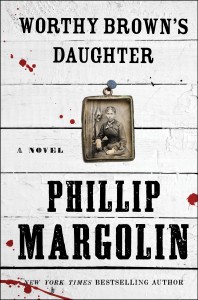Phillip Margolin: A Lesson for Aspiring Novelists
by Jeanne Greene
 Nobody ever told the younger Phil he could write. The author of Worthy Brown’s Daughter and seventeen bestselling legal thrillers, Philip Margolin, can laugh now — but there were no gold stars, no honor rolls back then. He hated school. Like any kid in New York who couldn’t put a sentence together, much less a page full of them, he was coded for future failure. He read voraciously, but the idea of writing something never occurred to him. Why would it?
Nobody ever told the younger Phil he could write. The author of Worthy Brown’s Daughter and seventeen bestselling legal thrillers, Philip Margolin, can laugh now — but there were no gold stars, no honor rolls back then. He hated school. Like any kid in New York who couldn’t put a sentence together, much less a page full of them, he was coded for future failure. He read voraciously, but the idea of writing something never occurred to him. Why would it?
He had to repeat math. When he took a chessboard to class with him, he was caught — but instead of confiscating the board, the teacher challenged him to a game. Soon, young Phil was beating his teacher regularly, providing a much-needed boost to his confidence, and he passed remedial math.
The chessboard proved a fitting precursor for Margolin’s career choice: he decided to be a criminal defense lawyer. “You don’t have to be Perry Mason to outwit an opponent and lure him into making the wrong moves.” His goal of becoming an attorney took him through high school, college, and, after two years in Africa with the Peace Corps, into New York University School of Law. By going to class at night and teaching high school in the daytime, he got his law degree and his first job, clerk for the Chief Judge of the Oregon Court of Appeals, which led him to private practice in Portland.
By this point, Margolin was writing. “If you read a lot and have a feel for a good story, you should be able to write a few pages about something, right?” A novel about his African experiences didn’t sell, but a crime story set in Portland did. Writing a few pages at a time because of his job — and because that’s what he was comfortable with — he completed a novel about a murder case as complicated as a chess problem. Heartstone, his first published novel, was nominated for an Edgar as best original paperback mystery in 1978 and made Philip Margolin a familiar name.
The rich history of Oregon fascinated Margolin. An article about Holmes v. Ford (1853), a heart-breaking case involving a former slave, led to six years of research for Margolin’s historical novel, Worthy Brown’s Daughter. Dissatisfied with the first draft but convinced the story had merit, Margolin was to work on Worthy Brown’s Daughter on and off for years.
Still, the law outweighed the writing. For twenty-five years, Margolin practiced law at the trial and appellate levels, speaking before courts as august as the Court of Appeals for the Ninth Circuit and the United States Supreme Court. His first responsibility was to his clients, some of whom were on trial for murder. He wrote, successfully, but always in his spare time.
The scale tilted in the other direction when book publicity required more time than a trial lawyer could spare. Although he loved the law — no, because he loved the law, Margolin had to leave it. He could have gone back if his writing career failed; it did not. His legal thrillers received numerous prestigious nominations, book club selections, and awards. One was an HBO movie, another, a TV miniseries. Every single one was a best seller.
Margolin did not forget Holmes v. Ford, however. In 2010, he finished the story of a white lawyer who, in 1860, represents a black man in court. Published in 2014 by Harper (after Sleight of Hand, 2013), and reviewed in the February issue of HNR, Worthy Brown’s Daughter is that rare novel that spans several genres: literary, historical, western, and thriller.
Worthy Brown’s Daughter is selling well, attracting new readers, and pleasing old fans, all thanks to the author’s perseverance. Not only can Phillip Margolin write — take note, aspiring novelists — he has faith in his writing.
About the contributor: Jeanne Greene has degrees in European History and Modern English History from UCR. She once lived in Suffolk, England, for three years. At home in Washington State, she has been a book reviewer for HNR since 2009.
______________________________________________
Published in Historical Novels Review | Issue 68, May 2014






